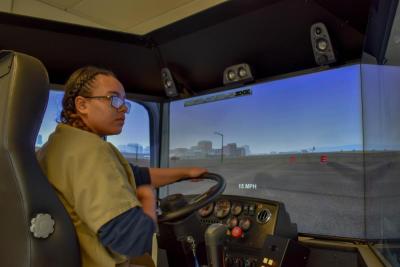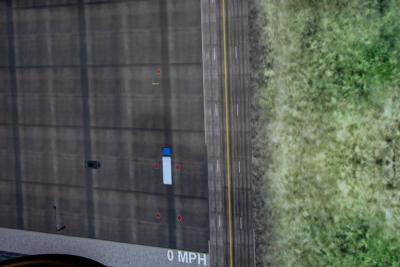Virtual program gets inmates ready for the road
If there’s an immediate skill Darnessa Almeida, an inmate at the Bristol County House of Correction, hopes to perfect, it’s backing up an 18-wheeler.
Last time she did it, she managed to knock over at least half the cones in the parking lot.
“Hopefully next time it’s at-most a quarter,” she said with a laugh.
Thankfully for her, it was just a simulation set up in one of the Dartmouth jail’s former visitation rooms — one that allows her and other inmates to train for a commercial driver’s permit test and the full driving/licensing test.
The stationary simulator features what a driver would expect to see in a traditional cab, such as a steering wheel, pedals, clutch, gear shift, and a compression release engine brake (commonly called a “Jake Brake.”) The main difference is the lack of wheels, weight and traffic.
According to Sheriff’s Office Spokesperson Jonathan Darling, getting the replica big rig cab was made possible by a nearly six-figure federal grant — part of the Workforce Innovation and Opportunity Act.
The law, passed in 2014, is designed to “help job seekers access employment, education, training, and support services to succeed in the labor market and to match employers with the skilled workers they need to compete in the global economy,” according to the U.S. Department of Labor.
Darling said the idea was first presented by a trip Sheriff Thomas Hodgson took to Washington D.C. “some years ago” where he was told that the federal government had these simulators inmates could practice on in order to fill an industry in need of workers.
Upon hearing that, Darling said, Hodgson told the government “he wanted that in the Dartmouth jail,” with it finally arriving at the facility this summer.
The simulation includes a number of scenarios including the basics of driving, reversing, and city driving. Prior to taking on the program, inmates were required to take a two-day course from the Registry of Motor Vehicles that would allow them to get their Class-D license reinstated.
During a recent session, inmate Lorrain Lugo opted to challenge herself by learning to operate the biggest truck available in the simulation, trying to back it into the bay doors of a fire station after initially parked at an angle.
“I figured if I get the hard stuff out of the way it makes the easy things easier,” she said.
Though it took a few attempts to back it into the virtual bay, she was ultimately proud that she was able to handle things relatively quickly.
Although, she was a bit jealous that classmate Almeida only had to pull out of the garage and reverse back in (along with a quick stop at the virtual gas station).
Still, Lugo said she’s grateful to have this opportunity at the jail, even if big rig driving is not her top choice for work upon her departure. What she said she appreciates most about it, is that it can allow her to get a CDL for use in other industries like package deliveries or transporting blades for offshore wind projects coming to the region.
“Those are pretty good fields if you take it seriously,” she said, adding that this will be her mindset moving forward.
Almeida agreed, saying that it’s good to have these programs that can allow her to “go further in life.”
She also encouraged more of her fellow inmates to give classes like this a try.
“Some people that come here have no structure or family,” Almeida said. “If you give them the tools to become something, you can change your life around.”
Currently, five inmates are enrolled in the class at the Dartmouth facility — three men and two women.
“And the girls are much better drivers,” Instructor John McDonell said, much to the delight of Almeida and Lugo.
Of course, the virtual rig can never compare to the real deal — something jail officials hope to make available in the near future.
What it does do, Jail Curriculum Coordinator Bill Villenau said, is allow inmates to know the basics of a setup once they can get that in-person practice.
“It’s just a great way to develop that muscle memory,” he said.
In addition to getting to know the controls, inmates also learn all the practical aspects that would appear on the real test.
Eventually, Villenau said, the sheriff’s office intends to collaborate with the Amaral Auto and Truck Driving school in Westport by either transporting inmates there or having instructors stop by the Faunce Corner Road jail.
In addition to the CDL program, the sheriff’s office has begun a virtual welding course taught by staff from Old Colony Vocational Technical High School, Villenau said, which can give inmates a leg-up in getting any apprenticeships upon their release.
“There’s a lot of opportunity in this region,” Villenau said. “Like [Almeida] said, it’s all about giving the people the tools.”



.jpg)










